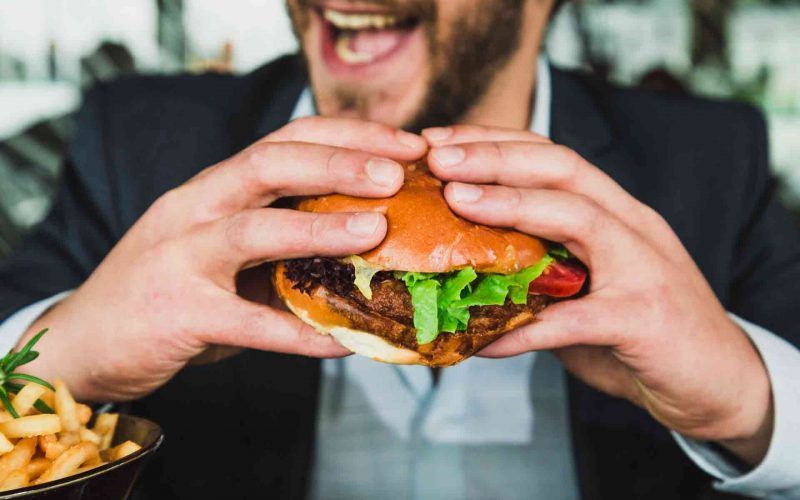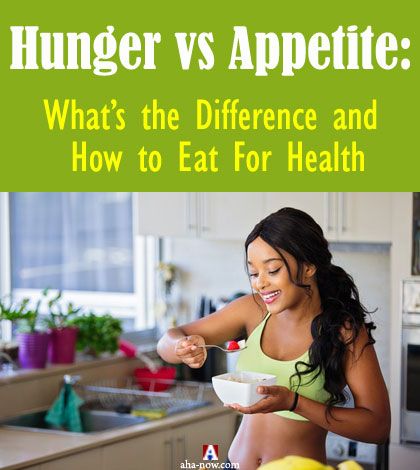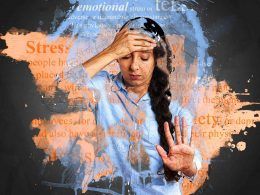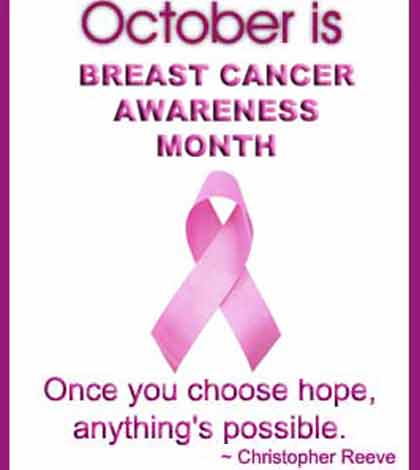Hunger vs Appetite: What’s the Difference and How to Eat For Health

Table of Contents
Health has two basic components – exercise and diet. To remain healthy, you need to eat food but you should know when, what, and how much to eat. While hunger and appetite are often used interchangeably, they’re not the same. Learn their differences in this post and know how to eat for health. ~ Ed.

Do you feel hungry all the time? Do you always crave sweets? And, do you want to eat more after having a satisfying meal?
The truth is you keep eating without ever getting satisfied. Yet, when you realize all the extra calories are taking a heavy toll on your health, you panic. You call yourself screwed up.
But here’s the thing:
Being hungry all the time isn’t your fault, at least not entirely. It has more to do with appetite. Unlike hunger which is a physiological need, appetite is caused by emotional or environmental cues (which you sometimes can’t control). When you eat for appetite, you may not feel full at all and end up eating more than you need.
The key to stopping the constant cravings is to curb the appetite. That’s what this post is for, to help you differentiate appetite from hunger and control it; so that you can eat for your body’s needs, feel satisfied after meals, and never binge-eat again.
Before we get to that, let’s go back to one fundamental question:
What is Eating
Eating is the act of consuming food. The food you consume can be plant-based or animal-based.
But whichever source it comes from, food has an important role to play, to fuel life activities. Without food, you wouldn’t have the energy to perform any living act from the most basic like breathing to more complex like walking, thinking, or writing. In other words, you would be dead.
Also, body tissues are made from nutrients from food. If you stop eating, the body will run out of materials to create new cells. This means plenty of you, including organs, muscles, and flesh will disappear.
To sum up, eating is a staple of life. It forms your body and keeps it functioning well.
Hunger vs Appetite
If the purpose of eating is to sustain life, then you should only eat when your body runs out of materials for fuel, right?
Well, that’s not always the case. Because in addition to eating for the body’s needs, you also eat for appetite.
Eating for hunger
Energy is the fuel of life. But as you work hard through the day, energy will run out. When it’s finally used up, your body will call for a replenish. This call for a replenish is hunger.
At the point of hunger, the level of glucose in your blood will rise. This triggers the release of the hunger hormone, ghrelin, in your gut. What follows is a series of hunger symptoms ranging from exuberating saliva in your mouth to grumbling stomach, dizziness, grumpy moods, etc. That’s when you should grab a bite.
Eating for appetite
Appetite, on the other hand, is your desire for food as a result of seeing, smelling, or thinking about food. Remember when you crave that melting chocolate balls for dessert when your stomach is already full. It’s the grand work of the appetite.
But appetite is also driven by emotions and habits. For example, you can be living with binge-eating disorder when you feel stressed, sad, or empty. Or if you eat at certain times, your body will crave food at that time, whether you’re hungry or not.
Because eating for appetite satisfies a desire, you’ll get a little dopamine boost. You may be unconscious of eating and keep eating to gain more “happy” hormones. As a result, you may take in a lot without feeling satisfied at all.
How to Curb Your Appetite?
Appetite isn’t bad. It may help to strengthen your social bonds and improve mental health. Say you can invite friends for a cake or enjoy cookies with your family on the weekends.
It’s eating for appetite all the time that spells trouble. Appetite can mask itself as hunger and cause you to eat uncontrollably.
Thus, you need to learn to tell appetite apart from hunger. It’s not hard, really. All you need is a few seconds listening to the body. Unlike hunger which can’t wait, appetite is very fleeting. The moment you see the chocolate cake, you may want to dive into it. But if you pause a moment and be aware of your need for food, you may not desire it anymore.
Try this. The next time you reach for a slice of cake, pause a minute, and ask yourself: “Am I really hungry or just want to satisfy an appetite?”.
If you’re not hungry and only eat to quench an emotion, ignore it and go on doing other things. Take a walk, read a book, call a friend, etc. — you’ll feel the whole lot better.
But There’s A Catch…
Even when you learn to curb your appetite, the all-the-time hunger still exists. That’s because you haven’t followed the right way of eating.
Like you, I used to be hungry all the time. Even when I managed to reduce my appetite, I still experienced dissatisfaction. It wasn’t until I ran into this book “The science of eating well” by Wallace D. Wattles that change happened.
I realized much of the dissatisfaction came from my unhealthy relationship with foods and bad eating habits. So I stopped blaming myself and paid attention to the body’s signal. To my surprise, I felt more satisfied than ever even though I ate less than my usual amounts. Hunger also lessened.
I can’t wait to share with you this secret to healthy eating I learned. Nothing’s out of your reach. Only simple stuff, you can try today. Here they are:
How to Eat for Health: 3 Golden Rules
There’s a way to way to eat for health. If you follow these rules, you’ll achieve satisfaction during and after eating.
Think Good Thoughts
First, you must believe all foods are wholesome if you eat them right. Be confident what you eat will nourish your body.
Stop restricting yourself to what you should or shouldn’t eat. Don’t ditch sugar or carbs out of diet because you think they make you fat.
Here’s the thing: The more you fear something, the more it will be attracted to you. If you fear sugar, you will consume it in large amounts unconsciously and its harmful effects will manifest in you.
To eat for health, you must think only good thoughts of health and nourishing food. They will direct you to the right choices which keep you healthy.
When, What, and How Much to Eat
When to eat: Eat only when you have hunger. You shouldn’t eat when you are sad, bored, or stressed.
What to eat: Eat whatever you like. If you want pasta for dinner, have pasta. Don’t be afraid that pasta will make you fat. If you want a cake, you can have that too. Though you find that when you eat only for hunger, you will want nourishing, nutrient-rich food more than empty-calorie ones.
How much to eat: Eat as much as you like. But the moment when you’re full, stop. A rule of thumb is to never eat until your stomach burst. That’s the sign of overeating; and overeating only makes you wretched.
Eat Mindfully
Sometimes, you feed yourself well but still feel hungry. That’s because you don’t take the time to enjoy your meal. It takes up to 20 minutes for your gut to signal your brain that it’s full. When you eat too fast, your brain may think you’re still hungry and take in more food.
So another rule here is to eat more slowly. Be mindful of your eating. When you eat, you should just eat. Don’t watch TV, scroll Facebook, or get lost in thoughts.
Then, you should chew your food carefully. Focus on the taste of food. Engage all your senses while eating. Notice the aroma, the sound of chewing, the seasoning of your foods. You will naturally chew each bite to liquid and absorb all its nutrients.
Also, be grateful. Think of the journey that foods come to you, the people who grow, deliver, and sell it to you, the fact that you’re eating with your loved ones. Eating with a grateful mind will slow you down. You can appreciate each bite and savor your food better.
Wrapping Up
Hunger and appetite are not the same. Hunger is your body’s natural call for food while appetite is caused by emotional or environmental cues. Unlike hunger which can’t wait, appetite can be quenched. You just have to pause a second and listen to your body’s signal.
If you want to achieve satisfaction after eating, heal your relationship with food. Eat for body nourishment, not fear. Take time to enjoy meals. Eat mindfully. You’ll derive immense joy from eating.
Over to you
Do you eat for appetite or hunger? Are you ready to curb the appetite and practice the right way of eating? Let me know in the comment.
Disclaimer: We're not offering any medical advice here. These ideas are for educational and entertainment purposes only. Always seek a professional medical opinion from a physician of your choosing before making any medical decision. The information provided here is not intended to be a substitute to the advice given by your physician or another healthcare professional.
Disclaimer: Though the views expressed are of the author’s own, this article has been checked for its authenticity of information and resource links provided for a better and deeper understanding of the subject matter. However, you're suggested to make your diligent research and consult subject experts to decide what is best for you. If you spot any factual errors, spelling, or grammatical mistakes in the article, please report at [email protected]. Thanks.











I sometimes feel that we have started to think too much in terms of eat diet and food and their properties. With Asian methodologies this was never a problem. We need to keep it simple. eat when you feel hungry and drink water only when you feel thirsty and after 60 mins of any meal. Everything functions properly and anything can be eaten.
Drinking water has been depicted too incorrectly. If you Follow this then no need to worry about hunger and appetite.
I’ve been overweight my whole life. I was unaware that the more I studied how to do the right things to be healthy and lose weight were actually escalating my weight gain. Eventually, I became aware of how uncomfortable I FELT every time I ate something because I judged it harshly based on all the food rules I’d learned. Long story short, over time, I analyzed each food rule and proved it to be simply some well-meaning person(s) truth, but not necessarily MY body’s truth. Thus, I released the rule from my thinking. In the last 2 years, I’ve dropped about 20 lbs. I eat what I want when I want it and don’t restict myself from anything.
As a Law of Attraction Life coach, I know that everything we experience has to do with how we think. So, as I’ve changed my thinking about the foods I eat, I’ve changed how my body responds to those foods. I have liberated myself from food rules and I’m so much happier for doing so!
To be healthy you need to eat a balanced diet. We pay more attention to whether the food is tasty or not, whether it is healthy or not. So thank you for explaining these things beautifully.
Nice blog about health.I totally agree with your points that we should eat healthy and take time to enjoy our food.
Thanks for your compliment. I’m so glad the post resonates with you.
Hello Naomi,
That’s True. Today people are eating for taste and not for health, it is very important to keep yourself fit and eating a healthy diet will surely keep you healthy. Thanks for your valuable contribution.
Regards,
Ovais Mirza
Hi Ovais,
I couldn’t agree more. Eating for taste is important, but we should balance that out with a healthy eating habit. It’s how we can be satisfied after meals and stay fit.
Thanks for reading my post. So glad you enjoy it,
Naomi.